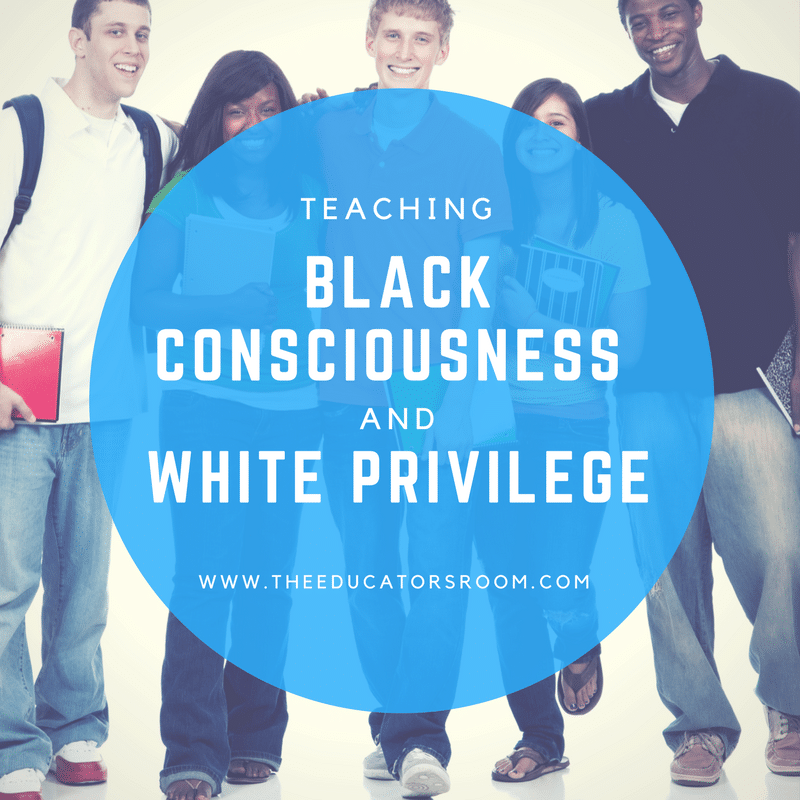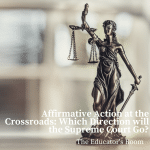One matter we have gotten over very quickly as a country is the notion, beginning in 2008 and carried throughout the Obama presidency, that we now live in a “post-racial” society. The fact that an African American was twice-elected to the nation’s highest office gave rise to the idea that racial discord can now be a thing of the past; that race was obviously no longer an inhibition to achievement or access to opportunity. That, in fact, all Americans are treated equal. However, growing attention to police violence and the onset of the Black Lives Matter movement served as reminders that the U. S. has some way to go before it is “post-racial.” How do we, as teachers address the issues of Black Consciousness and White Privilege in a way that engages our students in these difficult conversations and moves them into a deeper understanding of where we are as a society?
I teach U. S. History and a class on International Human Rights, which is a mix of historical case studies and contemporary issues. Here is how I address the racial issues that have been so much of our history, but are obviously ones with which we still need to wrestle.
Black Consciousness
I try to include a unit in my Human Rights class, which can be adjusted to U. S. or World History that addressed two ideas central to the historical and present discussion of race: Black Consciousness. Black Consciousness was an idea developed primarily by Steve Biko as a philosophy for blacks to fight the social and cultural oppression of apartheid in South Africa. In his short powerful essay, “Black Consciousness and the Quest for True Humanity,” Biko lays out a blueprint for black South Africans to gain control of their identity as well as to reclaim their history and culture. The essay shows how apartheid was not just a system of government, but a purposeful attempt to praise the Western roots of white South Africa while denigrating and nullifying the rich and diverse black culture, especially in terms of religion and education. Besides being important to the history of human rights, Black Consciousness has clear links to ideas that permeated America’s own civil rights struggles. So the hope is that a study of the extreme nature of segregation and racial oppression in South Africa helps students recognize the nature of segregation and racism in America, both historically and currently.
A terrific resource that reinforces the philosophy of Black Consciousness is the 1987 Richard Attenborough film about Steve Biko, Cry Freedom. The film depicts the friendship that develops between a white liberal journalist, Donald Woods (played by Kevin Kline), on whose book the film is based, and Steve Biko (played by Denzel Washington). I show the first two-thirds of the film, up until Biko’s murder in prison in 1977. The film does a terrific job spelling out the practical ideas of Black Consciousness in the context from which they were created: the poverty of the townships and the many injustices and the oppressions inherent in the apartheid system of government. Especially valuable is how the story shows the perception of Black Consciousness and ideas of privilege from both black and white South Africans.
White Privilege
We then bring the struggle for black identity to American culture through the current events of the Black Lives Matter movement and some of the events that created it, specifically police brutality and the historical context of the civil rights struggle (which was an earlier unit). An aspect of this study is also to get students thinking about white – and other – forms of privilege. We read Peggy McIntosh’s classic essay, “White Privilege: Unpacking the Invisible Knapsack” and a short thought-provoking article by Gina Crosley-Corcoran, “Explaining White Privilege to a Broke White Person.”
I teach in a school of predominantly white students, so discussions about white privilege can be intense. It is difficult, especially in American culture where we live under illusions of equality, easily accessible class mobility and rugged individualism, to convince others that they might be in a position of privilege. Consequently, I usually give students a more structured discussion, usually around a set of questions on the reading.
[bctt tweet=”discussions about white privilege can be intense” username=”EducatorsRoom”]
In addition, I set more clear ground rules for the discussion itself. Some of these may include:
- Every student has the opportunity to contribute to the discussion before someone speaks twice.
- Questions or comments directed to other student’s statements must focus on the content of the statement and not the student herself.
- All statements and questions must be courteous and non-accusatory.
- Interruptions are not allowed. Students are given the opportunity to finish their thoughts while speaking.
- Of course, students will personalize these readings; however, in the discussion, ask students to try to avoid “I” and “me” and focus on the larger question of how privilege affects society as a whole.
- Similar to how the conversation started, end by giving students the opportunity to state one thing that impacted them the most about the readings or the discussion with no other student feedback.
For the most part I have been very proud of how my students have handled this material. It requires them to be open-minded and to look uncomfortably close at their society and culture and their own place in it. Frankly, some students will not be able to make that leap. The result is that every so often a student or two become very defensive and personalize the idea of white privilege. Gina Crosley-Corcoran’s article addresses this question directly: How can I, for example, a white working class person who has had a lifetime of struggle, be the recipient of any privilege?
But there lies the crux of the issue: privilege is not something that is taken or earned, it is given by circumstance. As Crosley-Corcoran points out, privilege comes in many different forms, some of which are quite opaque because they have not been socially articulated or widely discussed. The real challenge for all of us, then, is not to feel guilt, point fingers, or take personal responsibility for every injustice, but to recognize where patterns of discrimination exist and to begin to think of ways to rectify them.
[bctt tweet=”privilege is not something that is taken or earned, it is given by circumstance. ” username=”EducatorsRoom”]
This is where the ideas of Black Consciousness and white privilege merge. Black Consciousness was designed to address the privileges so inherent in the blatantly racist apartheid system. And although lessons on white privilege can be an uncomfortable topic for many students, the goal is to encourage students of all backgrounds to think about the complexities and subtleties of racism and to help them understand their own ideas and attitudes.







I appreciate that you say this can be taught in various history classes. I teach this to 6th graders in an ancient civilization course. I compare and contrast laws that created systemic oppression in Hammurabi’s Code to modern day laws that create systemic oppression of people of color, specifically black men. There are so many ways to teach this subject. Thank you for sharing.
I’d be interested in how your 6th graders react. Do you find them, generally, pretty open-minded? Does it take a degree of background for them to put these pieces together?
White privilege???!!!!!!
Otherwise known as working for a living!!!!!!
Racist much??!!!!!!
Did you read the article? Or did you read the headline and leave this comment? The person who wrote this is Caucasian. Also, explain working for a living?
Joan, this is not an uncommon reaction to these readings. Please look at the Crosley-Corcoran reading and I’d be interested in hearing your reaction to it. Thanks.
Equality now means equality of circumstance? What balderdash! Since it’s impossible for every one in the U.S. to be equally rich in circumstance, by Ric Doringo’s logic, we all need to be equally poor in circumstance, something much easier to create: Communism.
The ultimate white privilege is Hunter Biden getting caught smoking crack, knowingly buying ILLEGAL DRUGS, driving drunk, smoking crack with picture evidence, getting a DUI, throwing a gun out in a garbage can, having underage girls in weird outfits on his laptop, etc… and having absolutely NOTHING DONE TO HIM, EVER EVER EVER, no jail time, despite if a BLACK man did even a fraction of this, he’d be in jail for 12-25 years…. …..now that, folks, is WHITE PRIVILEGE>